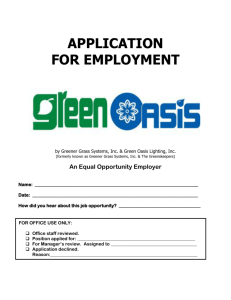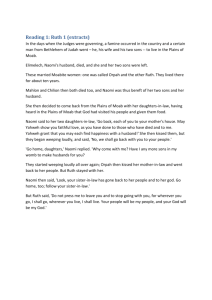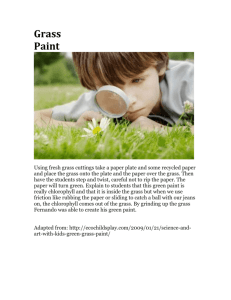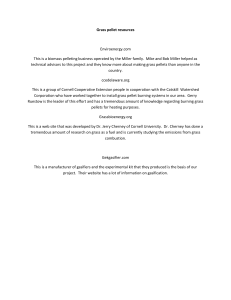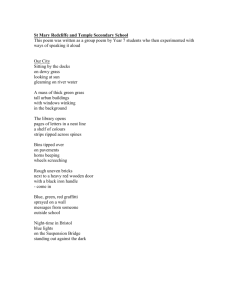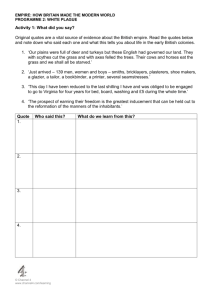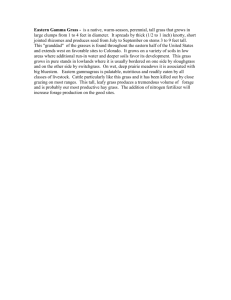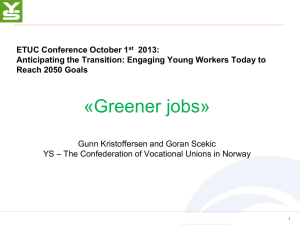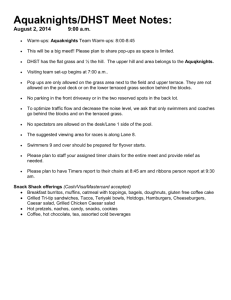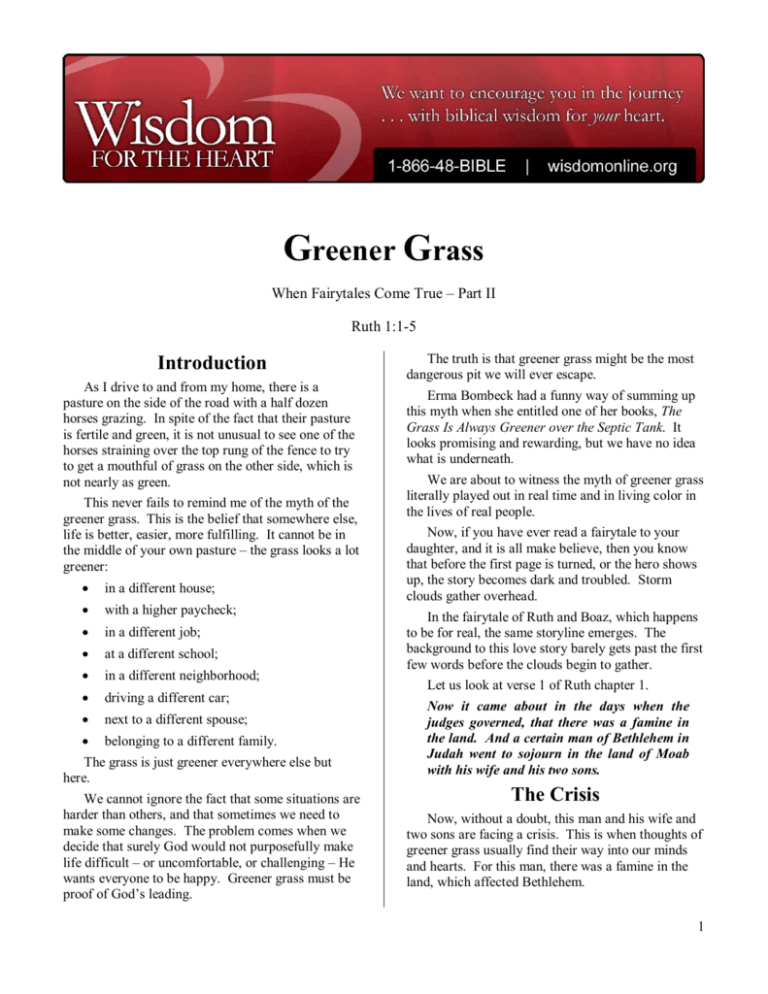
Greener Grass
When Fairytales Come True – Part II
Ruth 1:1-5
Introduction
As I drive to and from my home, there is a
pasture on the side of the road with a half dozen
horses grazing. In spite of the fact that their pasture
is fertile and green, it is not unusual to see one of the
horses straining over the top rung of the fence to try
to get a mouthful of grass on the other side, which is
not nearly as green.
This never fails to remind me of the myth of the
greener grass. This is the belief that somewhere else,
life is better, easier, more fulfilling. It cannot be in
the middle of your own pasture – the grass looks a lot
greener:
•
in a different house;
•
with a higher paycheck;
•
in a different job;
•
at a different school;
•
in a different neighborhood;
•
driving a different car;
•
next to a different spouse;
•
belonging to a different family.
The grass is just greener everywhere else but
here.
We cannot ignore the fact that some situations are
harder than others, and that sometimes we need to
make some changes. The problem comes when we
decide that surely God would not purposefully make
life difficult – or uncomfortable, or challenging – He
wants everyone to be happy. Greener grass must be
proof of God’s leading.
The truth is that greener grass might be the most
dangerous pit we will ever escape.
Erma Bombeck had a funny way of summing up
this myth when she entitled one of her books, The
Grass Is Always Greener over the Septic Tank. It
looks promising and rewarding, but we have no idea
what is underneath.
We are about to witness the myth of greener grass
literally played out in real time and in living color in
the lives of real people.
Now, if you have ever read a fairytale to your
daughter, and it is all make believe, then you know
that before the first page is turned, or the hero shows
up, the story becomes dark and troubled. Storm
clouds gather overhead.
In the fairytale of Ruth and Boaz, which happens
to be for real, the same storyline emerges. The
background to this love story barely gets past the first
few words before the clouds begin to gather.
Let us look at verse 1 of Ruth chapter 1.
Now it came about in the days when the
judges governed, that there was a famine in
the land. And a certain man of Bethlehem in
Judah went to sojourn in the land of Moab
with his wife and his two sons.
The Crisis
Now, without a doubt, this man and his wife and
two sons are facing a crisis. This is when thoughts of
greener grass usually find their way into our minds
and hearts. For this man, there was a famine in the
land, which affected Bethlehem.
1
Added to his crisis was the political upheaval
during the days of the judges. There was a collapse
of civility, morality, and true religious piety that we
looked at in our last session.
Then compound this man’s crisis with living in
fear of a Midianite attack, which could result in the
loss of cattle or even his own life.
Pile on to this the fact that the investment
potential in the land of Bethlehem had never looked
bleaker.
Now, at the very top of the heap in this crisis, the
cupboard is empty and the hayloft as well.
There is a certain irony or pun in the Hebrew
language that Jewish readers would have
immediately caught in verse 1.
. . . famine in the land . . . And a . . . man of
Bethlehem . . .
Bethlehem meant “house of bread”. In other
words, the bread basket of Judah is empty. People
who live in the “House of Bread” are going hungry.i
The original audience would have immediately
caught the contradiction in terms; the pun – “There is
a famine in the House of Bread.”
This is like talking about an increase in gang
warfare in Philadelphia, the “City of Brotherly
Love,” or the rise of demonic activity in Los Angeles,
the “City of Angels”.ii
The association of famine with Bethlehem – the
bread basket of Judah – would have created an
obvious twist in the story.
Bethlehem lay about six miles south of Jerusalem
and its name, “House of Bread,” was evidently
well-earned. Wheat, barley, olives, almonds, and
grapes were plentiful in ancient times. iii
However, now there is a famine in Bethlehem.
More than likely it is the famine mentioned in Judges
chapter 6, which helps us place this story with the
leadership of Gideon and the oppression of the
Midianites. Even more importantly, it helps us
understand that this famine was a result of the
Israelites’ rebellion against God.
God often used famine to bring the nation to their
sense of need. His design was not for the people to
leave the House of Bread, but to repent and obey Him
and He would again fill their houses with bread.
God had a way of using famine to refashion
faith – faith in His promises and provision. It was
testing that deepened character.
To add even more to the play on word meanings
is the fact that this man and his family will move to
Moab. The Lord called Moab, in Psalm 60:8, a
“washpot”. This was the pot used to wash dirty feet.
It would be akin to calling Moab a trash can – where
things to throw away were kept. This region was the
waste basket.
So, this Jewish family is in a crisis of faith and is
basically leaving the “House of Bread” and moving
to the dumpster. They moved from the bread basket
to the trash can.
Now, before we go any further, let us take a look
at the characters in this unfolding drama.
The Characters
There are six key players in this drama, but after
the opening verses, only three of them will be alive.
Verse 2 informs us that the patriarch of the family
was named Elimelech. Loosely translated, his name
meant, “God is my King”.iv
The tragedy of Elimelech’s life was simply the
fact that he did not live up to his name.
The next character is Naomi, Elimelech’s wife.
Naomi means, “gracious one”.
Then, Naomi and Elimelech’s sons make their
brief curtain call. Their names are Mahlon and
Chilion. They have rhyming names, which means
they could have been twins or they simply had a
mother like many of us, who wanted their children’s
names to begin with the same letter or end in a
rhyme.
They could have been like my ministry-minded
parents who named their four sons, Daniel, Jonathan,
Timothy, and Stephen. They said that often when
they introduced us in churches where they were
raising support, they would say, “We have four
sons – two from the Old Testament and two from the
New.” See if you can top that!
However, they could not resist, and my mother
gave three of us middle names that started with a
“D” – Duane, Dean, and Dale. Three “Ds,” which
looked a lot like my report cards growing up!
I do not know, but maybe Naomi had a little
paperback book, “200 Names for Boys that Rhyme”.
The reason I suggest this, somewhat
tongue-in-cheek, but somewhat seriously, is that
Naomi must have liked rhyming names because the
meanings of her son’s names are not good at all.
Mahlon means, “puny or weakling,” and Chilion
means, “pining”.
2
Imagine – their names mean, “puny and whiny”.
“Way to go, Mom! Thank you for giving me that for
the rest of my life.”
While we are at it, verse 4 gives us the names of
the future wives of these sons. One was named
Orpah, which means, “obstinate,” or literally, “strong
neck” or “stiff necked”.v
This is such a lovely name for a girl. I am fairly
confident we do not have any Orpahs in the audience,
so I can say that.
Then finally, the name of the second wife was
Ruth, whose name means, “comfort,” or perhaps
“friend”. vi
So, we have Mr. Puny marrying Miss Strong
Neck and Mr. Whiny marrying Miss Comfort.
Frankly, Ruth is the only one who does not seem
to fit the picture.
The truth is that they will nearly all literally play
out the meanings of their names. All except for one –
the only one who does not live up to his name is the
one who really should have – Elimelech, or “God is
my King”. In other words, “God is the master of my
life. God is sovereign in my decision making. God
comes first.” Not quite.
I want to point out one more clue about this
family. It is found in the middle of verse 2, where we
are told that they were,
. . . Ephrathites of Bethlehem . . .
Ephrath was the name of the wife of Caleb, the
famous and fearless comrade of Joshua. According
to I Chronicles 2:19, Caleb’s descendants were the
ones who settled Bethlehem.
Ephrathites were members of a clan that, as one
author said, “was the first family of Bethlehem; the
aristocracy of the town of Bethlehem”. This is to
simply underscore the riches-to-rags crisis hitting this
family.vii
What we have here are the Rockefellers now
living as immigrants; the Vanderbilts now homeless
and hungry.
So why should this family stay in Bethlehem
where the famine has reduced them, and everyone
else, to handouts?
“We’re used to a better life than this. Why stay
in the land of our faith and our forefathers? Let’s
move to where the grass is greener.”
So, the crisis now leads these key characters into
compromise.
The Compromise
From the ridge of hills on the edge of Bethlehem,
one can see the land of Moab. Moab was well
watered by winter rains that were driven inland by
the winds of the Mediterranean Sea.viii
Elimelech probably stood on this ridge
overlooking the dry grass and brown, parched fields
of Bethlehem and could easily see, less than fifty
miles away, just on the other side of the Dead Sea,
the green, fertile fields of Moab. Perhaps he thought
to himself, “We’ll only go for a short period of time.
God won’t mind. Our flight from His land and His
people will only be a quick visit and that’s all.”
Notice the progressive terms used in the first few
verses:
•
verse 1 says they, “went to sojourn in the
land of Moab,” with sojourn being a word
that refers to a temporary stay;
•
verse 2 says they then, “entered the land of
Moab and remained there”;
verse 4 says, finally, in an astounding text that
informs us, “they lived there about ten
years.”
Learn from Elimelech – the danger of greener
grass is that it can turn into quicksand.
•
However, this does not mean the greener grass
felt like quicksand. This family’s move was
evidently successful. They had ten years of
provision. They had a place to live. They had brides
for the sons. Life was good.
At the same time, they had knowingly forfeited
participation in the assembly of the Lord. They had
walked away from a community they should have
stayed to help. Elimelech could have led the way to
repentance and genuine worship. Instead, he ran
away, viewing greener pastures in Moab as worth
more than worship and fellowship with the
assembly – which were forfeited according to
Deuteronomy 23.
It is no wonder that the first five verses of Ruth
form the only part of this entire book in which God is
never mentioned once. And in a narrative like this,
the absence of God’s name implies the absence of
desire for God’s will. This is the only paragraph
where the name of God does not appear.
Elimelech could have argued, “I’m not gonna
become a Moabite. C’mon, I would never offer my
children or grandchildren to Chemosh, the god of the
Moabites. I’m not into child sacrifice and idolatry. I
would never do that or condone that. I’m not a
3
Moabite, I’m just gonna temporarily, you know,
forsake God’s word and the worship of God and go
live with Moabites.”
However, before long, sometime before his death,
Elimelech evidently picked out Moabite women for
his sons to marry.
Without warning, perhaps even to him, the
covenant promises of the land and the seed and the
prophets and the covenant-keeping God no longer
mattered – they all just faded away.
Pursuing greener grass has a way of lulling our
spirits to sleep.
What seems like a temporary compromise, no big
deal . . .
•
just a quick trip . . .
•
just a quick phone call . . .
•
just one bet . . .
•
just one sip . . .
•
just one personal expense charged to the
company account . . .
•
just one little lie . . .
•
just one purchase . . .
• just one click of the mouse . . .
. . . and the greener grass grows into a wilderness
where one can barely see daylight.
Perhaps Elimelech never intended to return, if
things worked out. Either way, this leading patriarch
of a leading family in Bethlehem who had
scandalized his community by moving to Moab,
would never return again.
The Consequences
Greener grass may lead to the graveyard.
Notice how suddenly the writer reports the deaths
of the men of this family. In verse 3, we read,
Then Elimelech, Naomi’s husband, died; and
she was left with her two sons.
Two verses later, we read in verse 5,
Then both Mahlon and Chilion also died . . .
There is no explanation; no medical diagnosis,
just the shocking news to everyone around them in
Moab, and certainly headline news in Bethlehem.
Most Jewish writers and evangelical writers as
well, read between the lines and contend that the
deaths of Naomi’s husband and sons were divine
judgments upon their unbelief. ix
This is like the subtle reference to the New
Testament believers in I Corinthians that certain
church members had died early deaths because they
approached the Lord’s table while cherishing,
planning, engaging in secret sins
(I Corinthians 11:30).
These sons of Elimelech disobeyed God by not
returning; by not converting their wives to the God of
Abraham; by not coming back with their father’s
body; by not caring about the ways of God. Their
early deaths were judgments for having assimilated
into the lifestyle and culture of Moab.
Now, the paragraph ends in verse 5 with Naomi
virtually alone. Notice she is,
. . . bereft of her two children and her
husband.
She alone was left to wonder, “Where did those
ten years go?”
Conclusion
Let me offer four observations from this scene in
which we have watched a man chase after greener
grass.
1. Observation #1: One sinful decision, apart
from seeking God, can lead to more wrong
decisions that draw us further and further
away from the path of wisdom.
You might say, “Stephen, what do I do about my
sinful decisions? I’ve made several of them and now
I’m off the path. I’m out of fellowship with Christ.
Am I going to die in Moab?”
Oh no. Jesus Christ can and will forgive every
sin you will confess – for those of you who believe,
restoring your fellowship with the Father; for those of
you who will believe, forgiving the record of sin
against you. And He happens to specialize in
redeeming sinners. I should know – I am one of
them.
However, if you are a believer and you have
made some wrong decisions that dishonor God, know
that true repentance is willingness to own up to these
actions and decisions as sinful violations of God’s
word and will.
Furthermore, true repentance will take
responsibility for the consequences of these sins – it
does not push it off on someone else; it does not hide
it under the carpet or try to get out of it.
True repentance owns up to sin and accepts the
consequences. In fact, consequences that may last
for years become God’s way of reminding you of His
4
grace and forgiveness and strength to do the right
thing and walk in obedience to Christ.
2. Observation #2: Deciding to pursue
greener grass rather than the glory of God
is the fountainhead of grief.
Five verses happen to represent a volume of
sorrow and grief. And it all began with a look, and
then a longing, and then leaving.
Greener grass merely disguised great grief.
3. Observation #3: Greener grass may make
a lot of sense, but making sense and
trusting Christ can be two different things
altogether.
Greener grass might make wonderful economic
sense, but spiritual loss. Greener grass might make
great personal advancement, but at the same time,
tragic spiritual digression.
Let us put this out on the table. The reason
greener grass can make so much sense is because our
hearts are selfish and corrupt and our minds are in
need of daily renewal and transformation
(Romans 2:1-2).
The heart of every problem is the problem of
every heart. We are our greatest obstacle to wise
living.
Because of our sinful hearts, disobedience can
make so much sense.
4. Observation #4: Famine in the will of God
is better than a feast outside the will of
God.
Take it from Naomi, who would say, “Have I
ever learned this one. Our short trip became a ten
year stay, and now it seems like it has ended with
three widows and three graves.”
This is not the end – in fact, all of this merely sets
the stage for a new beginning. God has a way of
taking people lost in Moab – the trash dump – and
setting their feet back on the path to Bethlehem – the
house of bread.
However, this will require submission. Naomi
and Ruth will experience the grace of God because
they ask for it. They return to the land of the Lord
for it. They are available for it.
God has a way of redeeming wasted years and
foolish decisions for those who want Him to, so that
like Naomi and Ruth, we can enjoy the favor and
fellowship of our Kinsman Redeemer, Jesus Christ
our Savior.
However, I am getting way ahead of myself. The
path back to Bethlehem is for our next study.
This manuscript is from a sermon preached on 11/16/2008 by Stephen Davey.
© Copyright 2008 Stephen Davey
All rights reserved.
i
A. Boyd Luter, Expositor’s Guide to Historical Books: God Behind the Seen (Baker, 1995), p. 24.
Ibid.
iii
Robert L. Hubbard, New International Commentary on the Old Testament: The Book of Ruth (Eerdmans, 1988), p. 85.
iv
C. F. Keil and F. Delitzsch, Commentary on the Old Testament: Volume 2 (Eerdmans, 1991 ed.), p. 472.
v
Hubbard, p. 94.
vi
Ibid.
vii
Ibid, p. 91.
viii
David R. Shepherd, Shepherd’s Notes (Broadman, 1998), p. 12.
ix
J. Vernon McGee, Ruth: The Romance of Redemption (Thomas Nelson, 1981), p. 53.
iiii
5

